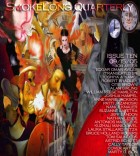No party. No candy. No children. What the hell kind of Halloween is this?
This is the fourth story I have written about Donat Bobet. The first three, “A Patron of the Arts,” “Donat Bobet in Africa,” and “Donat Bobet’s Tattoo” appeared on Claude Lalumière’s literary site, Lost Pages. Bobet gets by on meagre resources and a lot of imagination.
As far as Halloween without trick-or-treaters… Well, we’re in Montreal, so there are fewer trick-or-treaters to begin with probably. But Bobet lives in a building like the street that I myself live on. There just aren’t many kids in the neighborhood, and the ones that do trick-or-treat get rides into neighborhoods where the doctors and lawyers live. The candy is better there. Although I’d rather have one of Donat’s hand-made empty wrappers than a Hershey bar.
A poet and a pirate and a paper parrot. Hmm… Methinks something’s up. How did these elements come together for you?
The narrator of this story is a rather pedestrian fellow. That he makes a costume of the very sort that Bobet would approve—one made of text and imagination—suggests to me that he’s coming around more and more to the poet’s way of experiencing the world.
Where can I purchase some of those wonderful candies? And what other goodies might I find there?
M. Bobet will be happy to sell you some of the empty wrappers. But as for buying them, alas, the poet has eaten the factory. However, he encourages you to make your own. The best candy is one of a kind and already eaten; its attributes linger in memory, and you long to again taste what can never again be tasted. Now that’s candy.
I’m proud to say I spent my teenage years as a member of the Science Fiction Book Club and read Stephen King in the closet (because he was banned from my house). Your World Fantasy Award, Nebula Awards, and the Bram Stoker Award led me to deduce that you might be similarly inclined, yes? Where did your interest originate?
At my house, no books were banned. That does take some of the fun out of reading. For me, the forbidden thing was reading under the covers with a flashlight, long after my official bedtime. In particular, I devoured Ray Bradbury. Some of his work holds up very well, but I’m afraid that he ceased to grow much as an artist and later Bradbury reads like a bad parody. What a sad development for an artist. I hope it doesn’t happen to me, but it could. Perhaps I have already outlived my era, which will turn out to consist of last week, Monday through Thursday.
I devoured Bradbury, but I also devoured Gabriel Garcia Marquez. I found out pretty early that fantasy and its allied genres are some of the most fertile soil for art. Some. I was crazy about Hemingway, too, and Yasunari Kawabata. And Richard Brautigan. And Vonnegut. When I was in high school, Brautigan and Vonnegut were the usual suspects when it came to corrupting youth. A lot of us weird kids read them. I’d like to know who the weird kids read now. I hope the weird kids still read. They must. That would be one of the things that would make them weird.
As a writing teacher, do you ever ponder whether writers are born or made? And what can writing instructors teach to help “make” a writer?
Matters of form and technique are actually quite teachable, and understanding such subjects well enough to teach them is bound to be useful to the writer who teaches. Writing can be taught. Craft is a matter of seeing how things work, and practicing. A good teacher can nurture the student’s ability to see and can encourage the necessary practice. But it’s much harder to teach some vital subjects, such as Having Something to Say, or Knowing When the Teacher and All Of Your Peers Are Wrong. Then there’s the matter of staying with the writing much longer than you thought it would take to master. There’s the matter of not given up when you realize that in the arts, you never really arrive. You’re always beginning. Some people just aren’t ready for such a life, and who can blame them? A teacher can help, and some native talent is useful. Ultimately, though, the writers who succeed are largely the ones who just won’t quit.



 The core workshop of SmokeLong Fitness is all in writing, so you can take part from anywhere at anytime. We are excited about creating a supportive, consistent and structured environment for flash writers to work on their craft in a community. We are thrilled and proud to say that our workshop participants have won, placed, or been listed in every major flash competition. Community works.
The core workshop of SmokeLong Fitness is all in writing, so you can take part from anywhere at anytime. We are excited about creating a supportive, consistent and structured environment for flash writers to work on their craft in a community. We are thrilled and proud to say that our workshop participants have won, placed, or been listed in every major flash competition. Community works.